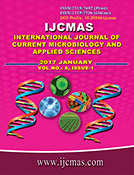


 National Academy of Agricultural Sciences (NAAS)
National Academy of Agricultural Sciences (NAAS)

|
PRINT ISSN : 2319-7692
Online ISSN : 2319-7706 Issues : 12 per year Publisher : Excellent Publishers Email : editorijcmas@gmail.com / submit@ijcmas.com Editor-in-chief: Dr.M.Prakash Index Copernicus ICV 2018: 95.39 NAAS RATING 2020: 5.38 |
Street foods are an important part of urban diets for the low and middle income group as they are readily available and low cost. Safety of these street vended foods is of vital importance from the public health point of view in developing countries like India. A total of 148 street food stalls in fives zones of Delhi were surveyed using an observation checklist to document available foods, physical condition of vending location, food preparation and handling practices and personal hygiene of street food vendors. Food items most likely to be microbiologically unsafe were identified. A total of 25 samples of kulfi and 20 vegetable momos with chutney were analysed for total plate count, coliform count, yeast and mould count and staphylococcal count. Samples were tested for faecal coliform and E.coli. HACCP plans were drawn out forkulfi and vegetable momos to identify critical control points in their preparation and suggest control measures. A wide variety of snacks, meals, desserts and beverages were being sold on the streets of Delhi. About 80% of the vendors indulged in risky food handling practices like handling food with bare hands, 95% used the same duster to wipe hands and utensils, 70% used unclean material for wiping hands and 31% did not keep their foodstuffs covered. About 14% of vendors were not serving hot food hot while 36% of the vendors were not serving cold foods cold. Microbiological analysis revealed that 22 (88%) samples of kulfi out of 25 were not fit for human consumption as per national standards. Only 9 momos samples out of 20 were found to be fit for consumption. All 20 samples of chutney were unfit for human consumption. The HACCP results were used to make suggestions which need investment more in terms of effort than cost for vendors in unorganised sectors. Besides using clean equipment and work surfaces, it is advised to reheat the kulfi mixture before freezing. While in case of vegetable momos, sautéing the momo filling can reduce contamination.
 |
 |
 |
 |
 |